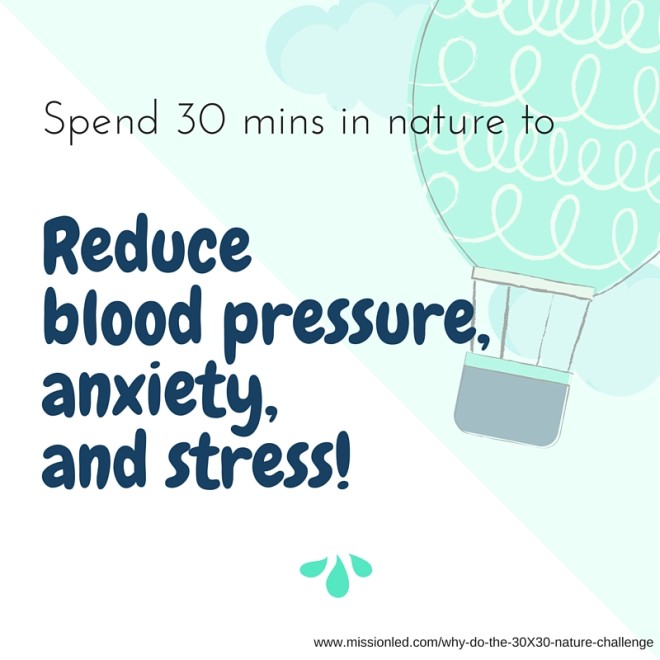Every May for the past 5 years the David Suzuki Foundation has organized a thirty day nature challenge that encourages all participants to get outside and experience 30 minutes of nature every day for thirty days.
If imagining yourself immersed in a ocean of trees, fresh air, and green grass isn’t enough to get you to sign up, check out our list of 10 reasons why you should join the 30×30 Nature challenge today!
1.- Taking a nature walk can increase memory and attention by 20%
A 2008 study done by Berman, Jonides & Kaplan showed that individuals test scores in a memory experiment increased by 20% after a walk through the trees compared to peers who walked down a city street or stayed indoors.
2.- Less than 10% of Canadian children get the recommended daily dose of physical activity
In 2009, the last time Stats Canada collected data on this issues, less than 7% of young Canadians met the national physical activity guidelines: 9% of boys and only 4% of girls. The majority of our kids spend most of their waking hours in sedentary pursuits. That’s not nearly enough!
3.- In “green-rich” neighbourhoods, depression rates can drop by 25% and anxiety can drop by 30%
In a 2014 study researchers found that higher levels of neighborhood green space corresponded to better mental health outcomes, when controlling for a wide range of confounding factors. The association between green space and mental health were “significant, sizeable, and persisted with different measurement techniques”.
4.- When human’s view natural scenery the areas of our brains associated with empathy and altruism light up.
Korean researchers found that when volunteers viewed urban scenes they experienced increased blood flow to their amygdala, which processes fear and anxiety. But, viewing natural scenes lit up the anterior cingulate and the insula—areas associated with empathy and altruism.
5.- Spending time in nature increases our ability to perform creative tasks.
In a 2012 study 56 adult hikers were asked to perform a creative thinking test. Half of them did the test before setting out on a four day hike, and the other half took the test on the last morning of the hike. The group that took the test after four days of being exposed to nature saw a 50% increase in performance.
6.- Being regularly immersed in a natural setting reduces blood pressure, anxiety, and stress levels.
A Japanese study showed that a 15 minute session of walking in a forest environment reduces stress more than the same experience in a city environment. They measured this through a number of indicators: lower concentrations of cortisol, lower pulse rate, lower blood pressure, greater parasympathetic nerve activity, and lower sympathetic nerve activity.
7.- When children are outside they move more, sit less, and play longer.
These behaviours are associated with improved cholesterol levels, blood pressure, body composition, bone density, cardiorespiratory and musculoskeletal fitness and aspects of mental, social and environmental health.
8.- Nature makes you feel younger.
Neighbourhoods with more green space have been found to improve job and life satisfaction while adding to the cohesion of the neighbourhood. A 2015 study found that having 10 more trees in a city block, on average, improves health perception in ways comparable to an increase in annual personal income of $10,000 and moving to a neighborhood with $10,000 higher median income or being 7 years younger.
9.- Being outside can reduce the likelihood of needing glasses for nearsightedness.
Research suggests that children who are genetically predisposed to nearsightedness will be less likely to need glasses just by spending more time outside. 14 hours of natural light per week is all it takes!
10.- Having a view of nature leads to faster patient recovery times in hospitals.
It’s been known since 1984 that a view of nature can reduce surgery recovery times for patients. Indeed, “patients with a tree view had shorter postoperative hospital stays, had fewer negative evaluative comments from nurses, took fewer moderate and strong analgesic doses, and had slightly lower scores for minor postsurgical complications.”
If you’re a workaholic:
These are just ten reasons, but there’s plenty more! Head over to the 30×30 website, to get even more motivation from their tips and infographics, and start getting outside!
About The Author

- Serial Entrepreneur, Technologist and Inventor my objective is to develop useful products that have a net positive effect in the lives of those that use them and the environment that we live in. CEO of Mission LED Lighting Company Ltd.
- 2017.12.27UncategorizedSaving the World and Saving Money: Green Home Improvements Every Homeowner Should Make
- 2017.01.17Be green & save5 Simple Green New Year Resolutions For 2017
- 2016.11.09LED factsReplacing a 400 HID Lamp for an LED
- 2016.09.26Be green & saveVintage LED Bulbs Make What’s Old New Again










Leave a Reply